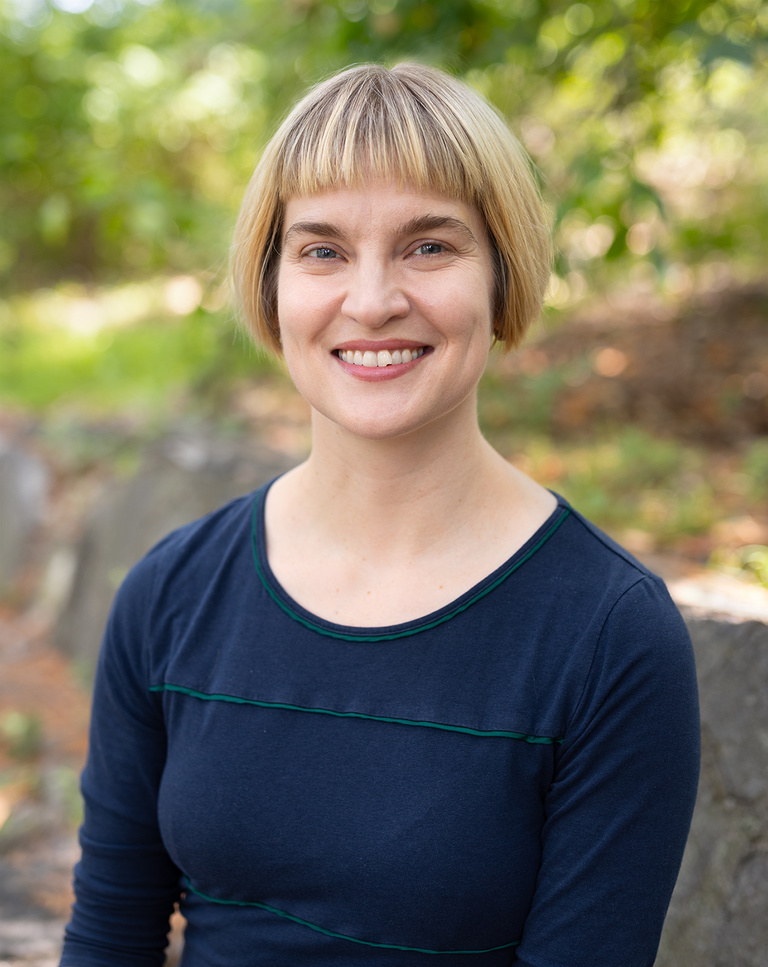When biochemist, Dr. Karina Kruth started working in the Williams Lab, she thought it would be her last year in science. Kruth was burned out on long hours in the lab and what she described as toxic work environments.
“After multiple horrible lab experiences, I thought, ‘That's it. I'm never doing science again,’” Kruth recalls. “I decided to apply to law school instead.”

Dr. Aislinn Williams changed that for her.
During her year in the Williams Lab, Kruth realized that sticking with science did not have to equate to the past experiences that negatively impacted her.
“Dr. Williams fostered an environment around positivity,” Kruth describes. “By being supportive, inclusive, and committing to good science, she reawakened the thing that brought me into science in the first place, and I did not go to law school.”
Williams’s ability to nurture a lab ecosystem that supports scientists with their objectives, while valuing their holistic identity, is one reason why Williams is the recipient of the Graduate College’s Outstanding Faculty Postdoctoral Mentor Award for the 2022-2023 academic year.
“When a postdoc comes in, the first conversation we have is about what it is they are hoping to get out of the postdoc,” Willliams says. “There is a lot more focus on what the postdoctoral fellow is wanting out of their career and wanting out of their life.”
Dr. Deniz Madencioglu, another postdoctoral fellow in the Williams Lab, describes what this type of postdoctoral mentorship looks like.
“Dr. Williams has an open mind to all of the possibilities for our future both inside and outside of academia,” Madencioglu remarks. “She also opens up her own network to her postdocs and graduate students.”
Mentoring in all directions
The importance of mentorship in science is undeniable. “Most people would say that mentorship is important, but it's more than just important,” Williams says. “It's essential because if you don't have mentorship, there are a lot of things that you're going to miss out on like opportunities for personal development, recruiting folks into your lab, and rebounding from failure.”
As the principal investigator of the lab, Williams draws on lessons that she learned from her own mentor in graduate school.
“My graduate school mentor, Dr. Hank Paulson, was always very honest and open to learning,” Williams describes. “It has been helpful for me to see this model of a person who does their best and can also acknowledge when they have learned something and talk about what they would have changed.”
Similar to how Williams’s mentor influenced her approaches to mentorship, Kruth passes on what she learned about life in the sciences to younger students in the lab.
“I try to foster similar relationships with the other younger people in lab, so that they can carry on and know that science doesn’t have to entail a toxic environment,” Kruth says. “All of that comes down to the foundation that Dr. Williams laid.”
Supplementing this trickle-down effect of mentorship, Williams notes that important mentorship happens from peer-to-peer.
“For people starting out in science, it is helpful to have peer-to-peer mentorship because what a senior person experienced may have no relationship to the young scientist’s personal experience,” Williams comments. “If you think about folks who are traditionally excluded from science, there aren’t a lot of people who look like them or have similar life experiences at those senior levels, so they have to build peer mentorship to help them get through their experiences.”
Madencioglu notes that mentors can also learn from their mentees, and she illustrates how Williams is always open to hearing the perspectives of others in her lab.
“Science changes and evolves quite fast. Sometimes the students come across novel approaches and will be more up to date because they are more immersed in the new technology,” Madencioglu says. “So, mentors should be open to new information and ideas just as Dr. Williams is.”
Collaborative brain development research
The Williams Lab focuses on investigating how genes that alter the risk for psychiatric disorders, like bipolar disorder and schizophrenia, change the way the brain develops.
“We're looking at how genes implicated in the risk for psychiatric disorders are expressed, and how this can increase the risk for disorders,” Williams explains. “We take those genes that have been implicated in humans and we look at how they're expressed in mice. Then we try to manipulate them in both mice and cells we obtain from patients to see how changes in those genes might alter the way that the brain develops.”
This type of research demands an eclectic breadth of knowledge, and the lab includes postdoctoral fellows and graduate students in biochemistry, neuroscience, molecular medicine, and genetics.
“Within the lab, there's a lot of collaboration because that makes the science better, right?” Williams says. “By having everybody function together as a team, everybody gets to learn from everybody else's skill sets. And everybody gets a slightly different take on the problem they're trying to solve.”
Collaboration in Williams’s research extends to working closely with individuals with bipolar disorder and schizophrenia.
“As a person who does both clinical work and research work, there is sometimes a disconnect between molecular cellular level research and the experiences humans have.” Williams says.
For instance, sometimes the symptom that seems the most prominent for an individual with a psychiatric disorder from the outside might not be the symptom that bothers that individual most.
“If we can talk with them about what their daily struggles are and what they actually want help with, then we give ourselves the opportunity to do something that helps them in the way that they want to be helped,” Williams says. "Because ultimately, we're doing this work to try to alleviate suffering.”
The impact of Williams’s work is felt through the applications of her research and through the mentorship tradition, which she passes down to postdoctoral fellows and future leaders in science, to equally value the science and the scientist.